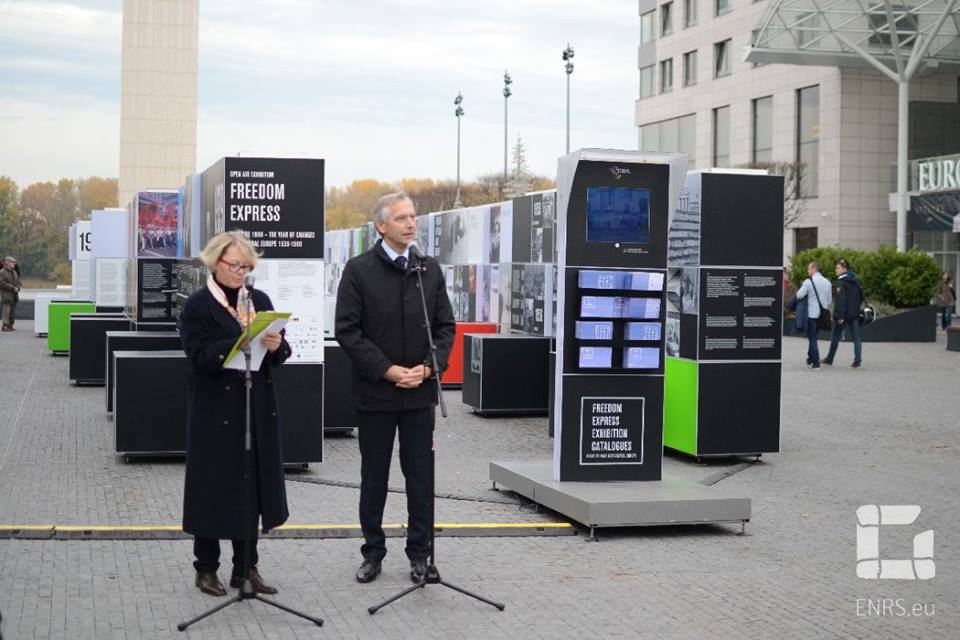Starting from 9 November ‘Roads to 1989. East-Central Europe 1939-1989’ will be presented on Milan Rastislav Štefánik Square (EUROVEA) in Bratislava.
The exhibition, designed by historians associated with the European Network Remembrance and Solidarity is included in the programme of the Festival of Freedom (Festival Slobody) - a multi-genre event organised to analise and commemorate the period of oppression in Slovakia and other countries of the former eastern bloc. The exhibition documents the complicated process through which our part of Europe regained its freedom from communist dictatorship.
The exhibition is part of ‘Freedom Express’, a social and educational campaign created by the ENRS together with the Slovak Ministry of Culture and the ministries responsible for culture in Germany, Hungary, Poland, and Romania.
The official opening of the exhibition took place at Milan Rastislav Štefánik Square (EUROVEA) on 9 November at 11 a.m. with the presence of Ján Figeľ, Deputy Chairman of the National Council of the Slovak Republic, the representatives of the embassies of the member countries of the ENRS in Slovakia – His Excellency Thomas Götz, Ambassador of the Federal Republic of Germany in Slovakia, Piotr Samerek, Minister Counsellor, Head of Section, Embassy of the Republic of Poland, Steluţa Arhire, Charge d’Affairs in the Embasy of Romania and Zsolt Harmati, Counsellor, Deputy Ambassador in the Embassy of Hungary. On behalf of the ENRS the exhibition was opened by Prof. Jan Rydel. The exhibition presented already in Berlin, Brussels, Warsaw, Budapest, Vienna and Bucharest concentrates on the various ways in which civil liberties were limited in the former communist bloc and on attempts made to regain them. It focuses especially on the question of what connects and divides remembrance of the events that preceded the fall of communism in Central and Eastern Europe.
Prof. Jan Rydel, chairman of the ENRS Steering Committee, explains: ‘The idea for this exhibition stems from the conviction that reflection on the 1989 transition in individual states becomes fuller and deeper when viewed in the pan-European context. Our aim is first and foremost to remind everyone of the processes that eventually led to the fall of communism in this part of Europe.’
Freedom is a special gift, which cannot be taken for granted. This exhibition commemorates times, when there was no freedom. I am very thankful to the organisers for bringing the exhibition here to Bratislava – stressed Ján Figeľ, Deputy Chairman of the National Council of the Slovak Republic during the opening ceremony. Where there is remembrance, there is respect, where there is respect, there is gratefulness, where there is gratefulness there is responsibility. Responsibility is the response to this gift of freedom – added Mr Figeľ.
Danube river, which is just behind us had divided Europe in the same way as the Berlin wall for many years. This exhibition shows faces of people who fought for the fall of such divisions, for freedom. This is thanks to them, that the wall and the iron curtain had disappeared. We show this exhibition in Bratislava hoping that it will be visited by many young people who need to be reminded about those difficult times –said Dr Ondrej Krajňák, chair of the Board of directors of the Slovak Nation’s Memory Institute and a member of the ENRS Steering Committee.
The exhibition presents an answer to the totalitarian system. It shows, that we not only fought against something, but also for things like freedom and other values, which decide who we are – stressed Piotr Samerek, Minister Counsellor, Head of Section in the Embassy of the Republic of Poland, while Zsolt Harmati, the Deputy Ambassador of the Hungarian Embassy, pointed out that only if we understand mistakes, which had been made, we can be sure that the remembrance about totalitarian systems is passed on to next generations.
